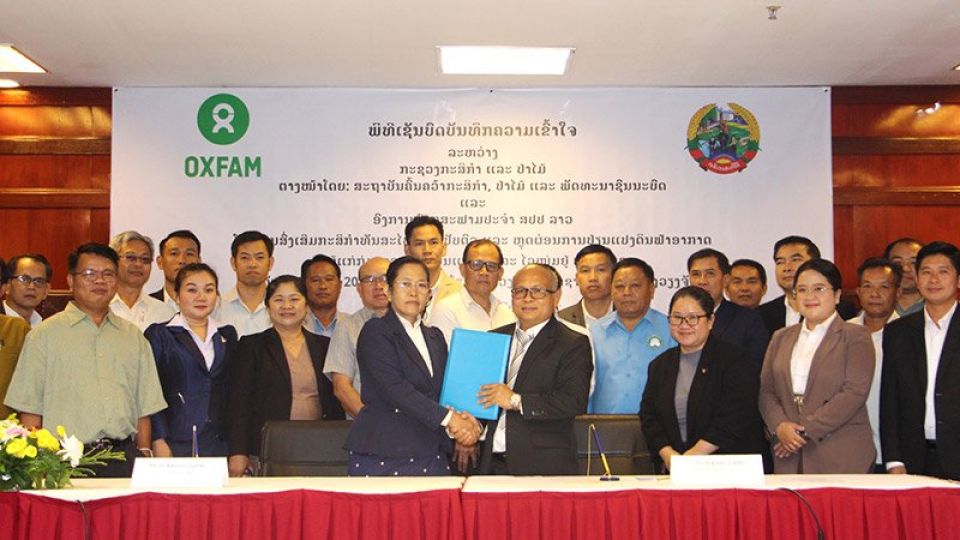March 28, 2024
VIENTIANE – EU provides 1.5 million euros for smart agriculture in Laos
The European Union (EU) has approved 1.5 million euros for implementing a project in Laos to promote smart agriculture to respond to climate change and to address the needs of vulnerable women and youth farmers’ groups.
A memorandum of understanding (MOU) for the project was signed in Vientiane yesterday by Oxfam’s Country Director in Laos, Mr Thasphorn Butaling, and Director of the Lao National Agriculture and Forestry Institute (NAFRI), Dr Chanthakhone Boualaphanh.
The project will be implemented in 15 villages in seven districts, of which three districts, Xepon, Vilabouly and Champhone are in Savannakhet province and four districts, Xiengngeun, Nan, Chomphet and Phoukhoun are in Luang Prabang province.
The project is expected to directly benefit a total of 300,000 farming families and 100,000 other people, especially through the provision of techniques, knowledge and skills related to Climate Smart Agriculture (CSA). It is also expected to improve yields, livelihoods, nutrition and food security.
The main objective of the project is to reinforce the capacities of women, youngsters, local authorities and groups of vulnerable farmers, and to promote CSA innovations and practices.
The activities of projects include building capacities to promote CSA practice among stakeholders at the central and local levels.
Laos is particularly affected by the impacts of climate change. Rising temperatures are causing seasonal changes in weather patterns, leading to increased flooding and extended periods of drought.
Currently, 72 percent of arable land is used for growing rice and more than 70 percent of the Lao population depends on agriculture for their livelihood, and 26 percent of these people live in poverty.
Many farmers engage in unsustainable agricultural practices that further degrade land and forests and exacerbate the impacts of climate change. This has the potential to expose a significant proportion of the population to worsening food insecurity, and stall or even reverse Laos’ efforts to reduce poverty and achieve the sustainable development goals (SDGs).
Women are particularly at risk from the impacts of climate change as they comprise more than 50 percent of the agricultural workforce.
These impacts are particularly severe if they also suffer from intersectional discrimination, associated with characteristics such as ethnicity, disability, and the need to care for children and elderly relatives.
There is an urgent need to introduce gender-transformative CSA practices, such as agro-ecology. These practices will help poor farmers adapt to the changing climate and mitigate against it more severe impacts.
The Lao Government has produced policies, strategies and plans, especially the Agricultural Development Strategy till 2025 and Vision 2030, to help introduce more sustainable practices and increase farmers’ incomes by enhancing agricultural value chains and increasing their productivity.
However, these are often poorly implemented due to disjunctive coordination between agencies, a lack of resources and the limited opportunity for poor farmers, particularly women, to participate in agricultural policy-making at the local and national levels.
This project can play a vital role in building capacities to stakeholders in central and local levels to effectively conduct advocacy campaign on CSA practices and strengthening CSA knowledge and supporting CSA practice to rural farmers to do it sustainably for adaptation and mitigation to impacts of climate change.


